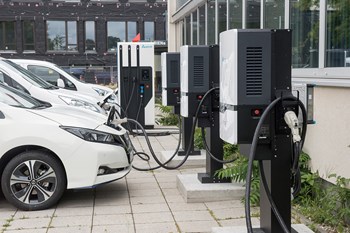 Delta, a global leader in power and thermal management solutions, today announced it is collaborating with Brandenburgische Technische Universität on an on-site proof-of-concept designed to test the feasibility of enabling a smart grid capable of balancing the power demand/supply between grid operators and electric vehicle (EV) owners. Delta’s EV charging infrastructure solutions, which include six 150kW Ultra Fast EV chargers and three vehicle-to-grid (V2G) bi-directional EV chargers, provide the foundation technology required for a viable end-to-end power management system that tightly couples the EV's storage to a realistic simulation of the main electricity grid on the distribution network operator (DNO) level.
Delta, a global leader in power and thermal management solutions, today announced it is collaborating with Brandenburgische Technische Universität on an on-site proof-of-concept designed to test the feasibility of enabling a smart grid capable of balancing the power demand/supply between grid operators and electric vehicle (EV) owners. Delta’s EV charging infrastructure solutions, which include six 150kW Ultra Fast EV chargers and three vehicle-to-grid (V2G) bi-directional EV chargers, provide the foundation technology required for a viable end-to-end power management system that tightly couples the EV's storage to a realistic simulation of the main electricity grid on the distribution network operator (DNO) level.
Prof. Dr.-Ing. Harald Schwarz from Brandenburgische Technische Universität stated, "We appointed Delta Electronics as an industry partner for this collaboration because of its diverse range of hardware and software EV charging solutions plus its ability to manage a project of this nature to a very high standard. Our choice has been more than justified."
Vincent Lin, senior director of e-Mobility & Smart Energy Solutions business development, Delta EMEA, added, "Delta is proud to have been selected for this project by Brandenburgische Technische Universität. It is an honour to help lead such an important and innovative development and one which will help move the world to a more productive use of renewable power supplies."
The challenge is to prove to the EV community that drivers will always have the power they need when they need it and the grid operators will be able smooth their loading, reduce CO2 emissions, enhancing the stability of the grid, and remove the need for major grid investments. To address this, the project comprises EVs (and their users), ultra-fast charging points for fast charging to their EVs, V2G bi-directional EV chargers for grid stability and decrease the power transmission within and between the power clusters, a simulation of a Smart grid - which is constantly fed with data from a real grid during archiving of the most recent grid status - and the software that is needed at every point along the chain.
Delta provided the project with six 150 kW Ultra-Fast EV Chargers and three V2G bi-directional EV chargers. The hardware is spread between the three participating institutions: Brandenburgische Technische Universität Cottbus-Senftenberg (BTU); Universität Potsdam; and Hochschule für nachhaltige Entwicklung Eberswalde (HNEE). Delta is also currently leading the development of a new communication and charge-point management backend system required at many points in the process, and which is expected to be completed by the end of 2020. The system is designed to be used at every point, both behind the scenes for control of - and communication between – devices, and at the human interfaces, including the EV drivers (via their smartphones), the charge point operators and the grid controllers. Delta attaches particular importance to using standardized software interfaces and open communication protocols. This simplifies the integration of the software to be developed into the ecosystem of e-mobility.
Delta was chosen for its deep experience in developing EV charging systems and control software. Delta’s background means that its technologies and skills closely match the technical requirements of the research project. It also lends its considerable software project leadership expertise to the development of the new applications needed to control energy flows to where they're most needed.
With Delta's considerable help, test vehicles are deployed to help understand the implications and opportunities for the blending of e-mobility with the electricity supply grid. Based on the results it generates, the project is expected to bring benefits to the Brandenburg community in terms of better EV infrastructure.